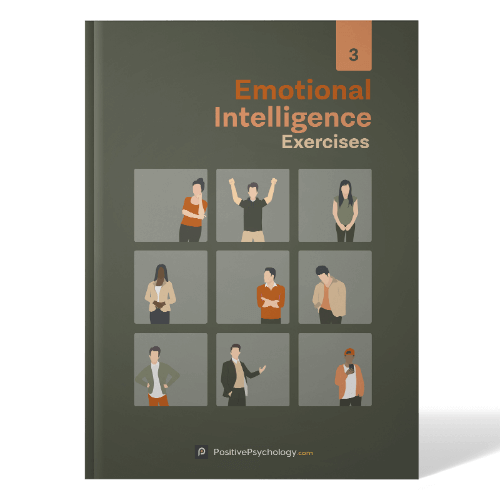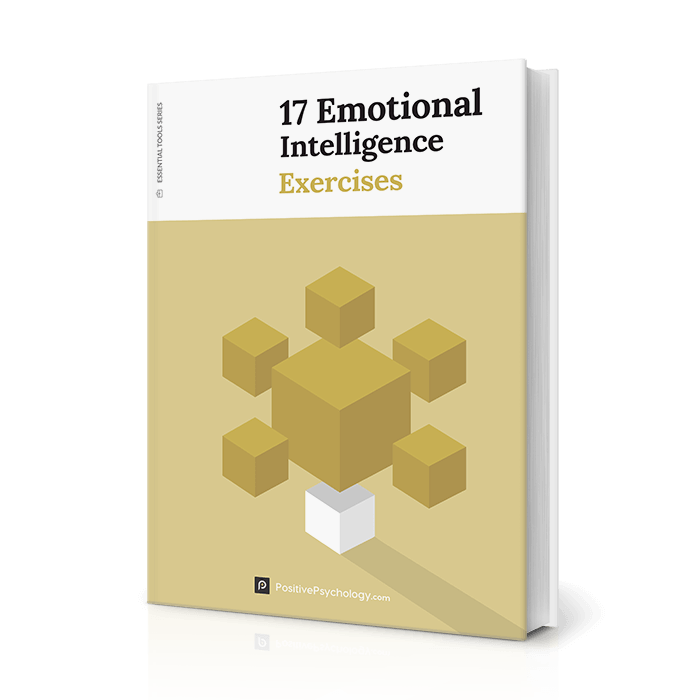

Maybe you have a no-nonsense approach to life, or perhaps you are just angry.
“Pathological anger can ruin your relationships, career, and health if you don’t take action,” but there are techniques that can help (Dyer, 2020, p. 14).
We know that everyone gets angry, but letting it get out of control is harmful. Anger management treatment helps people lead a full, happy, and healthy life (Karmin, 2017).
This article provides tips, techniques, and strategies taken from anger management therapy. It also introduces exercises and activities to take charge of emotions and keep anger under control.
Before you continue, we thought you might like to download our three Emotional Intelligence Exercises for free. These science-based exercises will not only enhance your ability to understand and work with your anger emotions, but also give you the tools to foster the emotional intelligence of your clients, students, or employees.
We don’t have to accept destructive anger-driven behavior, and, perhaps more importantly, neither should others. There is a wealth of literature and advice available to regain control of our emotions.
Anger is a real problem in society. Studies suggest that “eight percent of the adult population find it hard to control their temper,” and any of us can develop an anger problem (Dyer, 2020, p. 14).
There are, however, several tips that can start or keep us on the path to managing our emotions, before considering signing up for anger management therapy.
We’ve included some of the best below (modified from Dyer, 2020).
While a degree of anger is normal and at times helpful in our lives, we need to ask ourselves if we get consumed by rage. For example, do we lose control when we feel disrespected or see someone else treated poorly?
Key indications of a serious anger problem include the following (Dyer, 2020):
Recognizing there is a problem is the first step toward change (Karmin, 2017).
Finding techniques that help you cope with strong emotions and break the anger cycle is an essential next step in anger management (Dyer, 2020).
Out-of-control anger means that your emotions are dictating your behavior. Dyer (2020) offers several techniques to regain mastery over feelings and avoid acting in a destructive or harmful way.
Physical illness and physiological changes can cause emotional shifts. Seek medical help for severe mood swings and unexpected anger (Dyer, 2020; U.S. National Library of Medicine, 2021).
Medical assessments for these types of symptoms may include running tests, asking about, or discussing the possibility of:
While none of these factors are excuses for lashing out at others, they may suggest underlying factors worsening the situation.
The goal of managing your anger is to avoid saying or doing things that you will later regret. Managing your anger involves developing the skills necessary to successfully (Karmin, 2017):
Ask yourself, what is the hardest part of managing your anger when you are:
Use the answers to reflect on what you could do differently, and learn how to show yourself and others more compassion.

The following approaches can help someone respond differently to people and events that typically cause them to become angry.
In Anger Management – How to Take Control of Your Emotions and Find Joy in Life, Judy Dyer (2020) says that once you recognize the factors involved in triggering angry responses, you can learn how to break the anger cycle.
A typical angry response is the result of the following steps (modified from Dyer, 2020):
It doesn’t have to be this way. According to Dyer (2020), you can break the cycle.
Therapists often begin by focusing on a client’s negative thoughts or cognitive distortions (Dyer, 2020).
Ask your clients to consider whether the following statements hold true for them:
Ask your clients to challenge their negative thinking using the following steps (Dyer, 2020):
What advice would you give to a friend?
What supporting evidence do you have?
Is this a helpful thought?
What will you think in a week/month/year?
If the score is less than five, come up with a new thought.
Perhaps you feel less angry, lighter, and calmer.
When you next get angry, notice your thoughts. Are they cognitive distortions or negative thoughts? Could you replace them?
“Angry people often have angry relationships” says Dyer (2020, p. 53).
Over time, both partners can fall into a pattern of habitual anger unless the anger cycle is shut down. Instead, try to share one another’s needs and wants, and address issues as they arise.
Dyer (2020) suggests the following strategies:

These detailed, science-based exercises will help you or your clients understand and use emotions advantageously.
Download PDF
By filling out your name and email address below.
The following exercises and activities will help you identify, manage, and express your anger or your clients’ in more positive ways. In addition, you will find 15 anger management tests in our related article.
Fostering relationships is a worthwhile investment. Discussing problems and emotional upsets with friends and relatives can help control and manage emotions.
Not only that, “spending time with friends and acquaintances whose company you enjoy can inoculate you against stress and anger” (Catalano, 2018, p. 117).
Sports and exercise help manage anger and control emotions (Pels & Kleinert, 2016).
Walking, running, and gardening are effective at lowering anxiety levels, improving mood, and offering protection from stress and irritability (Catalano, 2018).
Our microbiome (bacteria in our gut) has a significant impact on our emotional and mental wellbeing. Research shows that gut health is essential to every organ in the body, including the brain (Thomson, 2019).
Eating a healthy, balanced diet can positively affect our cognitive and emotional state (Thomson, 2019).
Deep, slow breathing can have a positive effect on anxiety and depression.
A change to our breathing pattern, even a temporary one, can increase the blood flow and function of the brain and benefit both our physical and emotional wellbeing (Nestor, 2020).

The Positive Psychology Toolkit© is a groundbreaking practitioner resource containing over 500 science-based exercises, activities, interventions, questionnaires, and assessments created by experts using the latest positive psychology research.
Updated monthly. 100% Science-based.
“The best positive psychology resource out there!”
— Emiliya Zhivotovskaya, Flourishing Center CEO
Anger management starts with understanding the triggers.
Once these triggers have been identified, it is possible to avoid them, reduce their effect, or find ways to maintain emotional control (Dyer, 2020).
The following questions and exercise worksheets can help.

Understanding your history with anger can provide valuable insights into what triggers outbursts or damaging behavior (Karmin, 2017).
The questions in the Anger Management Journal prompt you to consider what happened, how you reacted angrily, and how you could have done things differently.
Once you have captured several incidents of anger, you can begin to identify patterns and plan coping mechanisms to use in the future.
The better you understand your anger, the more likely you are to manage your feelings and behavior, and cope with your emotions (Karmin, 2017).
The Tuning In to Your Anger worksheet asks a series of questions to understand the physical, emotional, and behavioral signs of anger.
The answers can improve your awareness of rising extreme emotions, such as anger.
“Distorted thinking involves thoughts that flash into your mind and make you feel worse” (Karmin, 2017). We all have them, and they are particularly relevant leading up to or during angry outbursts.
The Challenging Angry Thoughts worksheet explores whether you are making errors in how you interpret situations and helps you identify recurring patterns in your thinking.
The answers can help you recognize that your thinking patterns are sometimes distorted and explore how you could interpret them differently and more positively.
Anger management can be learned. Using suitable techniques, individuals will become better at identifying their anger triggers and implementing coping mechanisms. Clients can bring their anger under control.
Use the Imagining Being Able to Manage Anger worksheet to picture how life would be if you were able to get a grip on your anger.
The following questions form the acronym FADE (Catalano, 2018):
The worksheet can be kept and reviewed as a reminder of the client’s goals for managing anger and how their life will look when they gain that control.
Resentment can be another path to anger (Catalano, 2018)
Using the Releasing Resentment worksheet, respond to a series of prompts to reflect on the resentment you may be harboring and explore what it might be like if it were released.
Improving the client’s understanding of factors that fuel their anger can help them become aware of and manage the triggers.
Sometimes we are unaware of our anger and may fail to notice it building within us.
Use the Spot-check of Your Anger worksheet to review your anger, bring feelings into focus, and consider the actions you need to take.
There are other ways of identifying the triggers that lead to anger and managing our emotional responses, including the following.
Apps promoting mental health are portable and accessible, and can provide valuable interventions at any time.
Here are three of our favorites.
Happify offers evidence-based solutions for handling stress and life’s challenges. This app helps users improve their mental wellbeing and manage anger by forming new, healthy habits.

Headspace is a top-rated app that successfully promotes mindfulness and meditation skills. Such techniques are highly effective at gaining composure and objectively looking at our emotions, including anger.

Calm is another highly valued app that can reduce stress and anxiety by adopting a calm outlook in challenging situations. Use the tool to balance life, manage stress, understand related emotions, and adopt a more positive, healthy outlook.
Yoga is one of the most widely practiced alternative treatments in the United States and has been linked to several health benefits, including alleviating asthma and depression (Brown, Eubanks, & Keating, 2017).
Brown et al. (2017) confirmed the benefits of practicing yoga for improving relaxation, quality of life, and anger management.
Journaling is a well-used and valuable component of many therapy treatments (Myles & Shafran, 2015). Whether using a paper journal or digital apps, capturing and tracking the triggers and incidents of anger is a valuable and powerful technique for gaining emotional control and self-knowledge (Karmin, 2017).

These 17 Emotional Intelligence Exercises [PDF] will help others strengthen their relationships, lower stress, and enhance their wellbeing through improved EQ.
Created by Experts. 100% Science-based.
Throughout our blog, we have many practical tools to help clients better manage emotions and maintain a calm outlook when it’s most needed.
For instance, take a look at the following free materials:
17 Emotional Intelligence Exercises
If you’re looking for more science-based ways to help others develop emotional intelligence, this collection contains 17 validated EI tools for practitioners. Use them to help others understand and use their emotions to their advantage.
We all get angry, but when it becomes out of control, damaging our relationships at home and work, we need to seek help. Whether it originates in genetics, family background, imitation of others, parenting, or stress, extreme anger can wreck lives (Dyer, 2020).
Anger can become a habit. We end up stuck in a pattern of overreacting to minor issues or handling our emotions poorly (Dyer, 2020).
However, if we can recognize our lack of control as an issue, it is possible to break the anger cycle by identifying triggers that cause us emotional upset.
By slowing down our thinking and examining our thought processes, we can prevent angry thoughts from escalating and restore control.
Changing how we look at the problems we face and recognizing emotions without being consumed by them can break the chain of command between trigger and outburst.
The worksheets and strategies in this article help prevent and manage anger before we lose control. Try them out on yourself or with clients to see when each one is most effective.
We hope you enjoyed reading this article. Don’t forget to download our three Emotional Intelligence Exercises for free.
ReferencesJeremy Sutton, Ph.D., is an experienced psychologist, consultant, and coach. Jeremy also teaches psychology online at the University of Liverpool and works as a coach and educator, specialising in positive psychology, performance psychology, sports psychology, and strength-based psychology.

Share this article:
Jeremy,
I study umbrella of…..Narcissim Sociopathy & Psychopathy
A- they are angry people & some addicted so impulsive before and worse with Addiction as any would be ….
B- Sometimes they are so subtly aggressive, the VICTIMS DO NOT even notice “PROJECTION” that is going on….and VICTIMS get angry …as demeaned or lied to or blamed shamed ……………………………..but the ABUSE called PM PSYCH Manip is very bad and researchers know factually IS INCREASING. HINT- CHANGE WORDS and VICTIMS can do SAME STRATEGIES ………….and YOUR WORKSHEETS will HELP VICTIMS,…ie take a break- leave room – space people & ……..these 3 types are somewhat SADISTIC, so want YOU LOW ANGRY like them THEY prey on kind hearted people…….and sometimes save anger for families while are COMMUNALLY REGARDED as they like isolate to abuse. HAVE VICTIMS
“BUDDY-UP! Best WISHES Marilyn in Maine USA Reply
Thank you very much. This article has really helped me to understand and manage anger emotions. I would like to have another input or take the course on anger management. Reply
Nicole Celestine, Ph.D. on August 22, 2021 at 04:10Hi Esther, So glad you enjoyed the post. If you’re interested in learning more about anger management, definitely take a look at some of the courses on offer through Udemy as there appear to be a lot of highly rated options. We also offer a Masterclass on the broader topic of Emotional Intelligence, which will look at the topic of anger in relation to the full spectrum of emotions in ourselves and others. – Nicole | Community Manager Reply
Darcy on August 19, 2021 at 03:01I absolutely love these Dr. Sutton! Keep them coming. They seem to always arrived lined up to something I’m just about to explore because of things I might be up against with clients. Timing is right on. Funny how that works each time. Reply
SOLOMON VIDYA SAGAR on August 18, 2021 at 19:27It is very useful reading.I tend to get angry too quickly which I feel is not good & I have to overcome the same. Could be because of my Bipolar issue also. Reply
Annette Wells, LLMSW on August 18, 2021 at 18:02Thank you so much for this article. I have so many client struggling with Anger and as a new clinician I never know where to begin. This article will help me to prioritize my topics and provide necessary education and resources. As soon as I save my pennies I plan to purchase the tool box. Let me know if there are any discounts to veterans. Every little bit helps. Reply